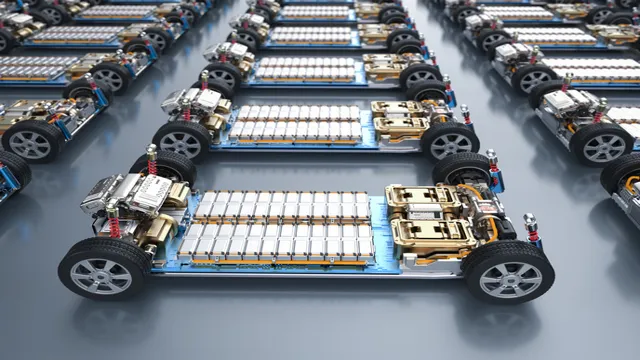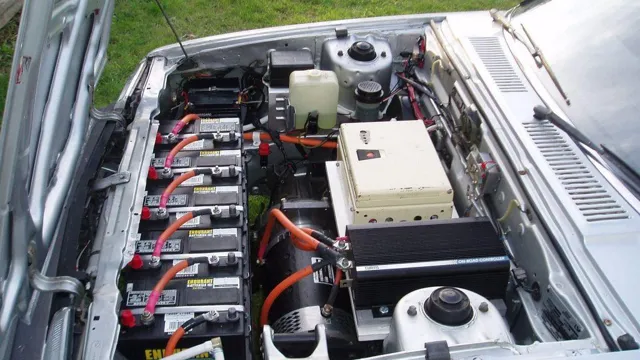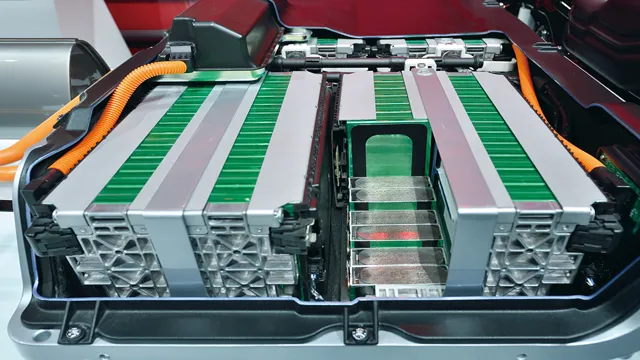Revolutionizing the Road: The Latest Breakthroughs in Electric Car Batteries
Electric Car Batteries: The Future is Here As we continue to develop more sustainable and eco-friendly options for transportation, electric cars are quickly emerging as a popular choice. One of the key components that make them so attractive is their efficient battery technology, which has come a long way in recent years. No longer just a niche item, electric cars are becoming increasingly common on our roads.
And as they become more mainstream, the batteries that power them are also improving, leading to longer driving ranges and faster charging times. At the heart of these batteries are cutting-edge lithium-ion cells, which are known for their high energy density and long cycle life. These batteries are designed to provide enough power to propel a vehicle for hundreds of miles while still being rechargeable.
And as advancements continue, we are likely to see even better battery options in the years to come. The benefits of electric car batteries extend beyond just sustainability. Not only are they better for the environment, but they also offer a smoother and quieter driving experience.
Plus, with fewer moving parts, electric cars tend to require less maintenance than traditional gas-powered vehicles. And as technology continues to improve, electric cars are becoming more affordable and accessible to a wider range of consumers. Overall, electric car batteries are leading the way towards a more sustainable future.
As we continue to prioritize eco-friendly options, it’s exciting to see how these advanced batteries will continue to evolve. With their impressive capabilities and potential, it’s clear that the future of transportation is electric.
History of EV Batteries
Electric car batteries have a fascinating history, starting all the way back in the early 1800s with the invention of the voltaic pile, a stack of copper and zinc discs separated by cardboard soaked in saltwater. While this early battery was crude and not very effective, it paved the way for subsequent innovations in battery technology. In the early 1900s, lead-acid batteries became popular for use in electric cars, thanks to their affordability and durability.
However, these heavy, slow-charging batteries ultimately proved impractical, and by the mid-20th century, most electric cars had disappeared from the roads. It wasn’t until the turn of the 21st century that electric car batteries began to once again see significant advancements, with lithium-ion batteries becoming the industry standard for their high energy density, fast charging times, and relatively low cost. With ongoing research and development in the field, the future of electric car batteries is sure to be bright, promising even more efficiency, affordability, and sustainability going forward.
From Lead-Acid to Lithium-Ion
The history of EV batteries spans over a century, and it all started with lead-acid batteries. These batteries were heavy and had limited range, making them less than ideal for electric vehicles. However, as technology improved, so did the batteries.
Nickel-metal hydride (NiMH) batteries were introduced in the 1990s and were more efficient than their lead-acid counterparts. But it was the introduction of lithium-ion batteries that revolutionized the EV industry. Lithium-ion batteries have a higher energy density, making them more efficient and able to store more power.
Today, EVs equipped with lithium-ion batteries can go farther and faster than ever before. With the development of solid-state batteries, electric vehicles are poised to become even more advanced and efficient in the near future. The EV battery market is rapidly expanding, and companies are investing heavily in research and development to create even more efficient and long-lasting batteries.
In conclusion, the history of EV batteries has shown us that innovation and technology can propel us towards a cleaner, more sustainable future.
Improvements in Energy Density and Range
The history of EV batteries is fascinating, with significant advancements made in energy density and range over the years. Early electric cars relied on lead-acid batteries, which were heavy and had a limited range of around 50 miles. However, in the late 1990s, nickel-metal hydride batteries were introduced, which offered improved energy density and allowed for longer ranges of up to 100 miles.
More recently, lithium-ion batteries have become the standard for EVs, providing even higher energy density and ranges of up to 300 miles on a single charge. Not only has the technology improved, but battery costs have decreased significantly, making EVs more accessible to consumers. With continued research and development, it’s likely that we will see even further improvements in EV battery technology in the future.
Advantages of Electric Car Batteries
Electric car batteries are a game-changer in the automotive industry. They offer a plethora of benefits that gasoline-powered vehicles simply cannot. First and foremost, they are environmentally friendly since they do not emit harmful pollutants.
Additionally, electric car batteries offer a quieter and smoother ride due to their design, which eliminates vibrations and noise associated with traditional combustion engines. Another advantage lies in their lower maintenance costs compared to traditional gasoline-powered vehicles, since they have less moving parts and require fewer tune-ups. Moreover, electric car batteries can be charged at home or at a public charging station while the driver is away, making them incredibly convenient.
Overall, electric car batteries offer a sustainable, cost-effective, and reliable solution for the future of transportation.
Lower Cost of Ownership
Electric car batteries have several advantages that contribute to their lower cost of ownership. First, they require less maintenance than gasoline-powered car engines. The batteries have fewer moving parts and don’t need oil changes or other regular maintenance to keep them running smoothly.
This means electric car owners will spend less money on maintenance over the lifetime of the vehicle. Additionally, electric cars can be charged at home or at public charging stations, which can save money on fuel costs compared to gasoline-powered cars. When fully charged, an electric car can travel for several hours without needing to be refueled.
This reduces the need for frequent trips to the gas station, saving time and money. Another advantage of electric car batteries is their durability. Electric car batteries can last for up to 10 years, depending on the model and use.
This means electric car owners won’t have to replace their batteries as frequently as gasoline car owners replace their engines. Overall, electric car batteries offer several advantages that make them a more cost-effective option for car owners looking to save money over the long-term.
Environmental Benefits
Electric car batteries offer numerous benefits for the environment. Compared to traditional gas-powered vehicles, electric cars produce zero emissions, which greatly reduces the amount of pollution and greenhouse gas emissions that are released into the air. Additionally, the use of electric cars decreases our dependence on fossil fuels, which are finite resources that contribute to climate change.
By using electric car batteries, drivers can also save money in the long run as they require less maintenance and have lower fuel costs. Overall, the advantages of electric car batteries are clear and show great promise for a cleaner, more sustainable future.
Instant Torque and Performance
When it comes to electric cars, the advantages of their batteries are numerous. One of the most significant benefits is the instant torque and performance they offer. Unlike traditional gasoline-powered cars, electric vehicles (EVs) provide power to their motors instantly, allowing for a quick take-off and swift acceleration.
This is because EVs rely on electric motors that have no gears, making them much simpler and faster than their internal combustion engine counterparts. EVs are also incredibly efficient, as they convert up to 60% of the energy stored in their batteries into motion. With an electric car battery, you can enjoy a smooth and responsive driving experience with unparalleled performance.
So, if you’re looking for a car that’s fast, efficient, and fun to drive, an electric car battery might be just what you need.
Different Types of Electric Car Batteries
Electric car batteries have undergone a lot of innovation and development in recent years, resulting in a wide range of different types available in the market. The most common type of battery used in electric cars is the lithium-ion battery, which is known for its high energy density and durability. However, there are also other types of batteries, such as nickel-cadmium, nickel-metal hybrid, and solid-state batteries.
Each type of battery has its own advantages and disadvantages, such as cost, range, and charging time. For example, solid-state batteries are known for their long life span and ultra-fast charging capabilities, while nickel-metal hybrid batteries are more affordable and have a longer range. When choosing an electric car, it’s important to consider the type of battery that best suits your needs and budget.
Lithium-Ion Batteries
Lithium-ion batteries are the most common type of battery used in electric cars, but there are different variations within this category. The two main types are nickel cobalt aluminum oxide (NCA) and nickel manganese cobalt (NMC). NCA batteries have a higher energy density, which means they can hold more charge, but they are also more expensive to produce.
NMC batteries have a lower energy density, but they are cheaper and more stable than NCA batteries. In addition, some electric cars use lithium iron phosphate (LFP) batteries, which are cheaper to produce and more environmentally friendly than other types of lithium-ion batteries. LFP batteries have a lower energy density than NCA and NMC batteries, but they are still a viable option for electric car manufacturers.
No matter which type of battery is used, the goal is always to balance energy density, cost, and safety to create the best possible electric car.
Nickel-Cadmium Batteries
One of the most common types of electric car batteries is the nickel-cadmium battery, also known as an NiCad battery. These batteries are known for their durability and ability to withstand extreme temperatures, making them a popular choice for electric cars. Despite their popularity, NiCad batteries have some drawbacks.
They are heavy and have a low energy density compared to other battery types, which limits the distance an electric car can travel on a single charge. Additionally, NiCad batteries contain toxic materials which make them difficult to dispose of safely. As a result, many car manufacturers have moved towards using newer, more efficient battery technologies such as lithium-ion batteries.
However, some older electric cars still use NiCad batteries due to their reliability and cost-effectiveness.
Charging and Maintenance Tips
When it comes to electric car batteries, proper charging and maintenance are crucial for maximizing their lifespan and performance. One essential tip is to avoid overcharging the battery, as this can lead to premature degradation. It’s also important to use the correct charging equipment and follow the manufacturer’s guidelines, such as timing and voltage, to ensure safe and efficient charging.
Some electric cars also have features that allow for pre-conditioning and scheduled charging, which can help optimize battery usage. Regular maintenance, such as cleaning the battery components and checking for any signs of damage or wear, can also help extend the battery’s life. Overall, taking these charging and maintenance tips into consideration can help electric car owners get the most out of their batteries, both in terms of performance and longevity.
How to Extend Battery Life
Battery life is a crucial element in ensuring that your devices are always powered up and functional. It can become quite frustrating to have your phone, laptop, or tablet go dead in the middle of important work or entertainment. The good news is that you can prolong your battery life by following some charging and battery maintenance tips.
To begin with, always use the original chargers and cables provided with your device. Using counterfeit accessories can damage your battery’s health and reduce its life span. Secondly, do not keep your devices plugged in to charge for longer than necessary, as this can cause overcharging and reduce the overall battery health.
Lastly, try to avoid exposing your device to extreme temperature conditions, as this can damage the battery and cause it to drain faster than usual. By following these tips, you can ensure that your battery lasts longer and your device remains functional when you need it the most.
Charging Do’s and Don’ts
When it comes to charging your electronic devices, there are a few important do’s and don’ts to keep in mind to ensure that your devices remain in good condition and last as long as possible. First of all, do use the charger provided with your device or a high-quality replacement that is specifically designed for your device. Don’t use cheap knock-off chargers that could potentially damage your device or even cause a fire.
Another important aspect of charging and maintaining your devices is to avoid overcharging them. While it can be tempting to leave your device charging overnight, doing so can actually decrease the overall lifespan of your battery. Instead, try to unplug your device once it reaches a full charge and avoid letting it drain all the way to zero before charging it again.
Additionally, it’s important to keep your charging port and cables clean and free of debris. Over time, dust, dirt, and other debris can accumulate in these areas, which can cause connectivity issues and even damage your device. To prevent this, simply use a clean, dry cloth to wipe down your device’s charging port and cable regularly.
By following these simple tips and taking good care of your devices, you can extend their lifespan and keep them working smoothly for years to come. So, next time you need to charge your phone or tablet, remember to use a high-quality charger, avoid overcharging, and keep things clean and tidy. Your battery (and your wallet) will thank you!
Future of Electric Car Batteries
Electric car batteries have come a long way since their introduction to the automotive market. They have revolutionized the way we travel and commute, providing a clean and sustainable mode of transportation that is becoming increasingly popular. The future of electric car batteries looks promising, with advancements in battery technology and materials leading the way.
Companies are investing heavily in developing batteries that are smaller, more powerful, and longer-lasting. Graphene is one such material being explored for its potential to improve battery performance. With its superior conductivity and strength, it could lead to the development of batteries that charge faster and hold more energy.
Other advancements include solid-state batteries that provide higher energy density and longer life spans. As electric vehicles become more mainstream, the demand for improved batteries will only increase, driving significant investment in research and development. The future of electric car batteries looks bright, and we can expect to see continued progress in this field, making electric vehicles even more accessible and sustainable for everyone.
Solid-State Batteries
Solid-State Batteries The future of electric car batteries looks promising, and that’s all thanks to the introduction of solid-state batteries. Unlike traditional lithium-ion batteries, these advanced energy storage units use solid electrolytes instead of liquid ones. This makes them denser, safer, and more efficient in terms of storage and charging capacity.
With traditional batteries, there is always the risk of leakage and fire, but solid-state batteries eliminate this risk. With this advanced technology, electric cars can achieve more extended ranges, faster charging times, and greater energy density. Not only will this increase consumer confidence in electric cars, but it will also significantly reduce the environmental impact of the automotive industry.
Solid-state batteries are still in the developmental phase, but once they hit the market, they’ll revolutionize the way we power our electric vehicles. It’s no doubt that solid-state batteries are the future of electric car batteries, and it’s exciting to see what’s in store for the automotive industry.
Wireless Charging Technology
Electric cars have been gaining increased popularity in recent years. A major factor driving this trend is the development of wireless charging technology for electric car batteries. This innovative technology allows vehicles to charge without being physically connected to a charging station, making it more convenient and efficient for motorists.
The technology works by utilizing an electromagnetic field to transfer energy to the car’s battery from a charging pad, eliminating the hassle of unsightly cords and clunky chargers. This advancement in charging technology is expected to revolutionize the electric car industry, making it easier and more affordable for people to switch to electric vehicles. Moreover, the utilization of wireless charging technology in public infrastructures such as highways and parking lots offers immense opportunities for electric vehicles to operate over long distances, thereby significantly reducing the need for fossil fuel-powered vehicles.
With the continuous innovation in wireless charging technology, the future of electric cars undoubtedly looks bright.
Increased Range and Efficiency
Electric Car Batteries As electric cars continue to gain popularity, the pressure is on to improve the batteries that power them. Car manufacturers and researchers are constantly looking for ways to increase range and efficiency, making electric cars a viable option for more drivers. The future of electric car batteries looks promising, with advancements in technology allowing for longer-lasting, faster-charging batteries.
One promising development is the use of solid-state batteries, which are smaller and lighter than traditional batteries and can hold more energy. Another is the use of silicon in the anodes of batteries, which can increase energy density and allow for faster charging. With these and other advancements, the future of electric car batteries is bright, and it won’t be long before electric cars become a mainstream mode of transportation.
Conclusion
After all, electric car batteries are the superheroes of sustainable transportation. They are the quiet crusaders fighting against climate change, one charge at a time. Their powers far surpass those of traditional petrol engines.
They are efficient, reliable and eco-friendly. So, next time you hit the open road in your electric ride, remember that your trusty battery is the real hero of the journey. And hey, who needs a cape when you have a charging port?”
FAQs
How long do electric car batteries typically last?
The lifespan of an electric car battery varies depending on the manufacturer and model, but most batteries are designed to last between 8-10 years or 100,000-200,000 miles.
Can electric car batteries be recycled?
Yes, most electric car batteries can be recycled. In fact, many manufacturers offer recycling programs for their batteries once they reach the end of their useful life.
How much does it cost to replace an electric car battery?
The cost of replacing an electric car battery varies depending on the make and model of the vehicle, but it can range from $3,000 to $10,000 or more.
Are electric car batteries safe?
Yes, electric car batteries are generally safe and have undergone rigorous testing to ensure they meet safety standards. However, like any other type of battery, they can pose a risk if they are damaged or improperly handled.





